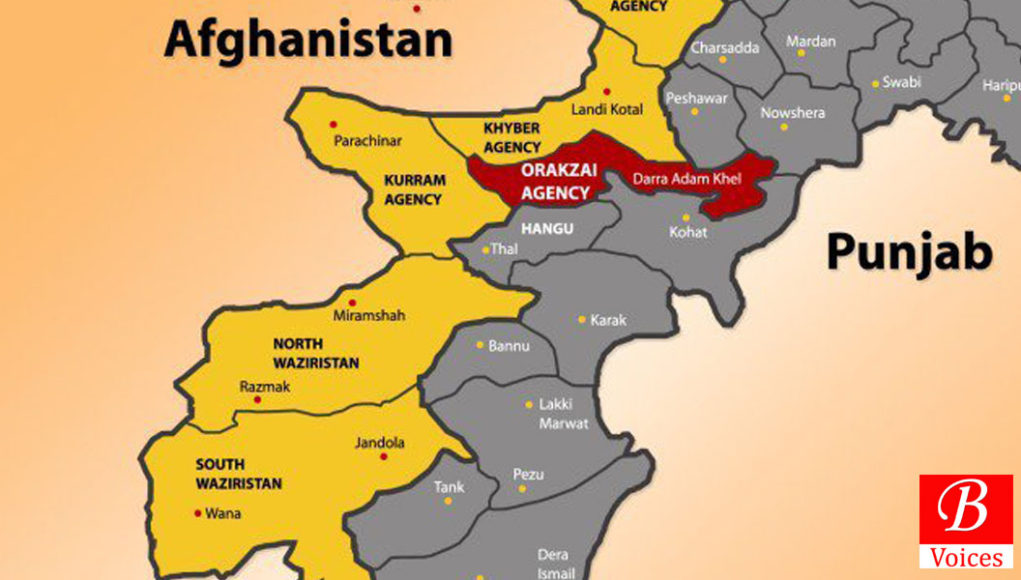Saddam Shah
The FATA issue is not only about the citizens of FATA, it is exactly of all Pakistan since its independence, though it is acknowledgeable fact that its people are the directly affected ones.
There are three regional parties having key role to shape the politics of FATA. Regional religious party, JUI (F) under the leadership of Fazal ur Rehman, who does much compromise to seek its political interests and being always on treasury benches proves the paradox, and the same case it did in FATA’s merging.
Another regional nationalist party, PMAP under Mahmood Khan, which is seeking political career in FATA and that is less or more possible in case of separate province for which the plebiscite is demanded by its chairman, and making FATA a separate province in such condition would be unjust to its people.
Awami National Party (ANP) under Asfandyar Wali Khan is one more regional nationalist party that is happy to merge FATA in KPK to raise its votes and funds, and also political pressure from expected second largest province of the country. Now nationalists of FATA are happy to be with KP, with whom it shares language and culture, there would be no more FCR, before law all citizens of the country would be equal, representatives of the people would be in three houses of legislation, even if some are not happy it is because of the political interest that every political manifesto has. It seems quite absurd when PMAP demands merging of Pashtun community on one side and oppose merging FATA with KPK on other side. It is mere dual standard of politics, and paradoxically trying for something which to it may be the beginning of new era for Pashtun’s regional politics, but that is just a myth in realist world, and running from the solution. When majority members of FATA in ‘Qabail Jirga’, decided for a separate province, was held by Balochistan based PMAP, and that wanted to spark their own politics. State can’t go with their local minds, who are neither capable of policy making nor they wholly represent FATA due to its low turnout in previous election of 2013.
FATA research center and other research centers in KPK in particular and in the country in general are kept aside in such traditional practice, and that values more, but may not in such regional sort of traditional legislation. When it comes to the politics of Pashtun nationalist in Balochistan, their interest highly contradicts that of FATA and KPK except being similar in culture even not same. They have political clash with Baloch nationalists in Balochistan and was not a province before 1971, but after abolition of FCR and merging in Balochistan, it developed more than FATA, so its political culture is quite on the other side of the coin.
Merging FATA in KPK will immensely affect the political culture of FATA with that of Pakhtunkhwa and ANP, a regional nationalist party will be in ease to spread out their agenda but not PMAP, which is not even known in Pashtun majority province of KPK. PMAP cannot promote its manifesto easily as other regional parties can, even though it has strong links in FATA, yet which can be a competitor with ANP in case of separate province. When a status of Gilgit Baltistan is demanded, that is again talking in irrational mode, as that is a region where Pakistan and India have yet not reached on consensus, as in that regards, Pakistan is just obedient to UN resolution, which is not as like on other side of the line. But FATA is not a controversial piece of land, nor it has claimed in UN by any foreign state since 1947.
When demanded for autonomous region of FATA, it is just to fuel the controversy but unfortunately it is not Kashmir and Gilgit Baltistan, and that is a very bifurcating topic, in short. The recent convention in Islamabad by the people of FATA with the collaboration of All Party Alliance in FATA unanimously decided to merge FATA in KPK, and demanded the ruling PMLN to immediately work on the reforms, but due to the traditional politics the cabinet dropped FATA Reforms from its ongoing agenda merely because of the intense controversy among regional parties.
Note: This is part 2 of two part series on the topic. Click here to read Part1.
Disclaimer: Views expressed in this article are those of the author and Balochistan Voices not necessarily agrees with them.
Share your comments!








